Colin addressing delegates at a Sydney seminar, providing conservation solutions for an anchor from the wreck of the Dunbar. Colin was one of many generous conservators who contributed to a conservation report, compiled on the day, for the Woollahra Council, which was responsible for its care. Photo by Dr Ian MacLeod, courtesy Donna Hinton
Colin’s Funeral
Kay Söderlund, CCAE graduate and current Director of Preservation Australia Pty Ltd and Conservation Resources shares her memories of Colin’s funeral.
Colin’s funeral was held on Tuesday 26 April at Broulee Crematorium. It was a wonderfully sunny day, with a real autumn feel to it. During the service we found out that this was Colin’s favourite time of year, mainly because of the leaves.
It was a full house-mostly made up of friends of Colin and Gwyn, from the community in which they clearly lived a full life. Who knew that one of Colin’s favourite songs was Teddy Bears’ Picnic, which opened proceedings. There were also quite a few conservators there; the ‘old’ crowd was particularly well represented. There was much reminiscing, both during the service and after, at the sumptuous afternoon tea.
During the service, Gwyn described their very full life of travel, golf, and singing. Colin’s surviving brother travelled from England and also spoke at the service. He looked a lot like Colin, and definitely sounded the same, which both made me smile and cry at the same time. His two sons were also there and spoke briefly about their father-his older son is the spitting image of Colin.
Jan Lyall delivered an excellent summary of Colin’s professional life-and what an impressive career he had. Considering his achievements, I found myself marveling at how he remained such a modest man-down to earth, and always with time to assist a fellow conservator.
Without exception, those conservators that I spoke to came to pay homage because they felt they owed their professional life to Colin: “I wouldn’t be where I am if it wasn’t for Colin” and “I couldn’t NOT come today”, were phrases I heard many times that sunny afternoon. He will be missed and he will be remembered.
Personal messages
Many of Colin’s former students, friends and colleagues sent personal memories and messages both before and after Colin’s passing. With their permission we include these here.
The Conservation Office in Hong Kong
In perpetual memory of Colin and his unparalleled contributions to the conservation profession. RIP. —Shing-wai Chan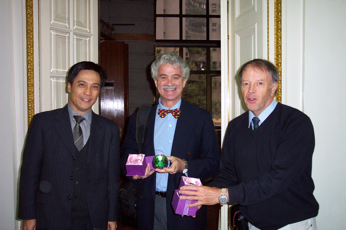
It was you who encouraged me to apply for my first travel scholarship for an international conservation conference. Thank you for bringing me the experience which had opened up my eyes. You will forever be remembered. —Alice Tsang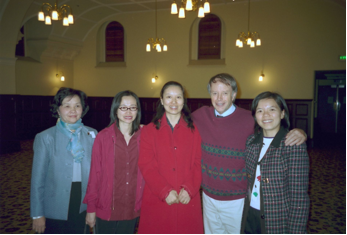
I am honored to be one of your students and will never forget your advice on “compromise in conservation”. God rest you in peace and quiet, Colin. —Jonathan Tse
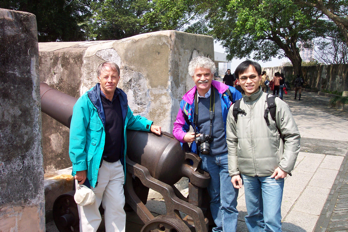
Neal Putt
I worked with Colin for 7 years, on the founding of the Pacific Islands Museums Association and related programmes.
One of the thoughts I have most often of Colin is the evening we attended the special pool-side dance recital organized in honour of a PIMA event by the director of the Museum of Tahiti and the Islands at the Meridian Hotel, outside Papeete. The dance troupe were 12 to 18 year-old girls, in the classic fantasy garb of the Polynesian Islands, and the director of the troupe was the museum director herself. At this point in his life, Colin had already received double hip transplants, and was waiting for a further set of operations to change the hip transplants for a new set. At the close of the formal event, the museum director invited us all down to the pool-side floor for a post-recital dance with the troupe of Polynesian girls. Colin was there right away, dancing up a storm, completely natural. It was to me an example of the unaffectedness, goodwill and enthusiasm of the person, that he would throw himself into dancing the evening away, when in fact the whole job of work in Tahiti was quite difficult, and on top of that he was dancing on two worn-out hip transplants.
Colin was not always an easy character, because in cooperative work there is no guarantee that everyone and all institutions will always agree on strategies and results. But when there was conflict, with Colin it was always for sincere motives. He was so lively, so much fun, so determined and obviously capable and intelligent. He was well-meaning and helpful towards all others, which is a very important quality. I am sad to know that he is gone.
—Neal Putt, Cultural Heritage Translator, Rome.
Robyn Sloggett
Professor Colin Pearson AO MBE was the inspiration that has given me the drive to continue the conservation education legacy that he established in Canberra, as best as we can in Melbourne. Through all the challenges of running the program in Canberra I never saw Colin deviate from his commitment to the profession and to the idea of a fully rounded professional with the ability to draw on a range of skills, as and when appropriate. I remember when I was visiting the Smithsonian and then a week later at the Met in New York, and both heads of labs commented that they would take students from the University of Canberra program because they were so exceptionally well-trained and capable. I’m very very proud to have been one of Colin’s many students. I know that the students we are graduating through at Melbourne are the legacy of Colin’s pioneering establishment of conservation education in Australia, which we examine every year in our first class. Colin was a member of the inaugural advisory committee for the Centre for Cultural Materials Conservation, and was instrumental in the early program development. I will always be immensely grateful for Colin’s belief in what we are doing, his support and his mentoring over so many years. Professor Colin Pearson AO MBE was the inspiration that has given me the drive to continue the conservation education legacy that he established in Canberra , as best as we can through Melbourne. Through all the challenges of running the program in Canberra I never saw Colin deviate from his commitment to the profession and to the idea of a fully rounded professional with the ability to draw on a range of skills, as and when appropriate. I remember when I was at the Smithsonian and then a week later at the Met in New York, and both heads of labs commented that they would take students from the University of Canberra program because they were so exceptionally well-trained and capable. I’m very very proud to have been one of your students. I know that the students we are putting through at Melbourne are the legacy of your pioneering establishment of conservation education in Australia, which we examine every year in our first class. Colin was a member of the inaugural advisory committee for the Centre for Cultural Materials Conservation, and was instrumental in the early program development. I will always be immensely grateful for Colin’s belief in what we are doing, his support and his mentoring over so many years.
—Robyn Sloggett, Director of The Grimwade Centre for Cultural Materials Conservation.
Christine Ianna
Dear Colin
Belatedly I’m writing to let you know that I’m saddened not to have taken the time to say to you before how much you have helped shape my work in conservation. I also wish I’d said to you, when I’d last saw you at the Melbourne conference before you headed off to Italy, how much your quirky smile meant to me-it quietly amused me and also at times made me very nervous.
I remember going to Canberra in July 1989 to start my Masters in Conservation, I was going to meet this person who worked on the Endeavour canons. The person who worked at DSTO and had done so much analytical work on metals, chloride extraction etc etc whose name was synonymous with the Canberra College of Advanced Education, who could read and write Pourbaix diagrams, recite galvanic series and knew heaps of chemistry. The first thing you asked the group of three of us that started that semester on our masters was ‘what do you know?’ and I didn’t have an answer. Was I awe struck? Probably somewhat but I felt so much like an unwritten book. I did stay in Canberra for the next six months, lived and breathed Conservation, never finished my Masters, but came away with great contacts, friendships that have lasted as long and an approach to conservation and preservation that has underpinned my entire career. It fostered in me a love and passion for metals and their corrosion and degradation that few understand and I’m proud to say that this largely came from the time I spent at the CCAE in 1989 and wouldn’t have happened without the lure and opportunity of studying in Canberra with the person ‘who had worked on the Endeavour Cannons and anchor’ and who loved metals, chemistry and conservation.
THANK YOU! And keep smiling wherever you may be.
(PS the DSTO Technical note on the Treatment of the anchor and cannons still has pride of place on my bookshelf!)
—Christine Ianna, State Library of Queensland.
Carl Villis
As a University of Canberra graduate from 1991, I have had more than twenty-five years in the profession and had time to reflect on some mighty contributions made by individuals along the way. With this perspective I can honestly say that no one could ever match Colin’s achievements. Quite simply, his name is synonymous with the establishment of the modern practice of materials conservation in our country. It was through his efforts that the critical work was done to establish a platform for education and professional practice and ethics, which carried through to the foundation and growth of the course in Canberra. I have said this before but it is worth saying again: there is not a single person working in conservation in Australia who has not benefited directly from Colin’s foresight and years of nurturing our profession. What respect we have collectively gained is in no small part thanks to him.
As a hopeful young conservator in 1988, I remember being intimidated by his reputation when I sat to be interviewed for the course, but once I joined I came to appreciate his gentle nature and cheeky humour, which made it a pleasure to be around him. It has been many years since our paths crossed but my admiration and respect for him has never diminished.
With thanks and gratitude,
—Carl Villis, Graduate of the University of Canberra. Currently Paintings Conservator at the National Gallery of Victoria.
Anne Carter
I remember travelling down from Brisbane in 1991 for an interview for admission to the University of Canberra course, and I recall first meeting Colin (was he really dressed in a pale coloured safari suit?) and Benita Johnson for the interview. It was much more relaxed interview than I imagined as I showed my portfolio, but I recall becoming nervous as they watched me cutting between the threads of a piece of stabiltex to demonstrate manual dexterity. This interview occurred in the sunny library at the top of the steps, which later I was lucky enough to frequent on many occasions. Colin’s teaching, as many have said was enthusiastic and encyclopaedic. Somehow with all the workload we still managed to have a lot of fun. I had learned about the professional of conservation while travelling overseas and it felt so exotic to be immersed in such a fascinating field of study in Canberra with an English Professor. I loved Colin’s material science courses and, although not much of my corrosion science has been retained, I would like to thank Colin for giving such heart to his teaching. I last saw Colin at the AICCM AGM in Melbourne in 2014 as part of the ICOM-CC conference. I still feel a little uneasy as we were proposing a motion to change the AICCM constitution to remove the need for AGM notices to be mailed by post, but instead to enable receipt by e-mail. Colin disputed the addition of e-mail into the constitution saying that we wouldn’t always have e-mail, but the change was voted in anyway. It’s a tiny thing, but typical of Colin to care about the details and to care so much for the AICCM, and I keep wondering if he was right. Many thanks and rest in peace Colin.
—Anne Carter, Graduate of the University of Canberra. Currently Paintings Conservator at QAGOMA.
Elizabeth Hadlow
Colin: I was one of the youngest students enrolled in the conservation course at UCAN and at times found the experience daunting. One of my most significant memories of that time is your humour, which made my time studying conservation so much more enjoyable. In the years since we have met up at conferences and you always managed to say or do something that let me know that your students were always people first and students second. I love the profession I’m in and you are one of the main people to thank for my opportunity to pursue it. Thank you so much.
—Elizabeth Hadlow, Graduate of the University of Canberra. Currently Senior Conservator at State Records Authority of NSW, Sydney, Australia.
Ian Batterham
I commenced study at the CCAE at the very unripe age of 18. I was actually a bit too young and found the course a bit of a struggle. It was such a boon to me that Colin was prepared to be very supportive when I went a bit off the rails for a period. If it wasn’t for Colin I might not have found my calling in life, a calling which has been extremely rewarding, and which continues to make my life a joy. I sat next to Colin at the ICOM-CC meeting in Melbourne in 2014 and I felt a real warmth coming from him, like I had somehow justified his faith in me all those years ago. I think many of his students would have similar stories. I hope we, his prodigies, will continue to justify the faith he had in us and pass that faith on to the next generation of conservators.
Thank You Colin
PS I have one memory from, I think, my first lecture from Colin, in 1978. There was an older student named Geraldine who rudely interrupted Colin to say “were you responsible for the work on the Cook Cannon?’ Colin sheepishly said “yes’ she then said “I think they look awful!”. Poor Colin, he was flustered but pointed out she know nothing of the difficulties of conserving marine artifacts. She left the course soon after.
— Ian Batterham, Graduate of the CCAE. Currently sessional lecturer at University of Canberra.
David Stein
I want to thank Colin for the wonderful career that I now enjoy. Without him I would not be doing what I am doing today, that is a given. His vision has created numerous opportunities for so many. For me, I am so grateful to him for a wonderful profession that I love which has grown into a thriving conservation practice where I have the pleasure of working with six wonderful professional paintings conservators.
—David Stein, Graduate of the University of Canberra. Currently Director, David Stein & Co. Conservation of Fine Art.
Kim Morris
Colin, we (the Australian and New Zealand cultural conservation sector) have you to thank for your vision in establishing and formalising the conservation profession in our region. Your vision, leadership and legacy remains cornerstones. Under your guidance, generations of excellent conservators were produced by your CCAE/UC course. We all have you to thank for our careers. Your contribution to the conservation of Australian (and world) heritage is unrivalled amongst us.
On a personal note, I thank you for your advice, support and encouragement, always delivered with care and good humour. The path I have followed professionally is based on something you told me a long time ago: to use my treatment skills as a practicing conservator. That is my strength so stick with it. Great advice indeed that has served me well. Colin, thank you. My best thoughts are with you. You are irreplaceable.
—Kim Morris, Graduate of the CCAE. Currently Director of Art & Archival P/L.
Erica Burgess
I’m not sure who to write to but I must write something to acknowledge how significant Colin was, and will continue to be, in my life. From the 1980s encouraging me to move from my job in Tasmania to Canberra to study and then to work elsewhere before, as has eventuated, moving back to Tasmania.
As well as the slog of study there were the fun times like the crazy cricket matches that Colin organised on the Bungendore Green, and other social activities and field trips. In recent years I hadn’t seen much of Colin but when I did at the ICOM-CC conference in Melbourne in 2014 I was reminded of how much of an inspiration and mentor he was, his ceaseless work and encouragement of others to actively contribute to our profession. Colin was always interested in what one was doing and thinking, whether about work or outside interests as many of them can’t be separated. His wit and telling stories of past events over a glass, or two, of wine would keep us in fits of laughter…and it was Colin who drew old and new colleagues and friends together. With warm wishes, Erica.
—Erica Burgess, Graduate of the CCAE. Currently Paintings Conservator Tasmanian Museum and Art Gallery.
Carolyn McLennan
Dear Colin
I carry your professional enthusiasm, knowledge and passion for the field of conservation which you shared with us as students as you guided and moulded us into Conservators and for which I am eternally and deeply grateful. What a brilliant thing you did starting that Canberra course and how lucky I was that you accepted me as a student and that I went through that program. Thank you.
You know we called you Uncle Colin, which you may have thought was cheeky at the time but it was actually a term of respect. I have been married now for 2O years to Tibby Quall an Aboriginal elder in Darwin and have two (plus four-the first family) wonderful children. Through family ways I understand the depth and extent of this term of respect and am pleased that we came to call you this. I wish you all the very best now, you’re an excellent man Colin, we really love you. With Deep Regards, Carolyn McLennan and family.
—Carolyn McLennan, Graduate of the University of Canberra. Currently working in the Northern Territory.
Victoria Pearce
When I entered the Canberra course I said to Colin that I had been told that I didn’t have any chance of getting through the program because it was said that no one who had gone through Art School had ever made it successfully through the program. Colin retorted “Why not?” and as one who had indeed graduated from Art School I found myself fully supported by Colin. He was a huge man, full of humour, encouraging, wonderful in his generosity, with immense faith in his students, who were generally treated as cohorts, not novices.
At the Melbourne International Conference he introduced all the students to relevant mentors and guided us all to be part of a whole profession and we didn’t need to be self-serving or personally networking. His ability to help build bridges and make networks for others was amazing. I doubt that I would even have a career if it weren’t for him.
Now I feel privileged to be paying it forward, with my own private practice I have interns and students of my own and feel Colin remains an example of how it should be done. He may be off on a new journey but his legacy is impossible to measure, as it will live on forever in the people he taught and the people they will go on to teach. Colin is our profession and always will be.
The shock of his passing is great and I haven’t seen him for over a decade. I guess we all thought that he would be a constant….like Boyle’s Law. The profession has the need of great mentors more now than ever and his shoes can’t be filled by one person alone. My deepest sympathies to the people who knew him more and who loved him the loss must be so painful. I hope it is comforting to know we are all affected by his passing.
He still remains the only lecturer I know who fell asleep in one of his own classes…Made us love him all the more. GOLD!!
—Victoria Pearce, Graduate of the University of Canberra (2001). Currently Director Endangered Heritage, Canberra.
Donna Hinton
Having come to Australia from Canada in 1980 especially to study conservation at the Canberra College of Advanced Education (now the University of Canberra), Colin Pearson was the first person I met. Initially I could barely understand his English accent, but once I caught on to his words they were always worth listening to. And Colin also listened to his students. Even after graduation Colin continued to support me, and so many others. I have happy memories of Colin and Ruth Norton’s visit to Hong Kong in 1982. They came to oversee the internship program at the Hong Kong Museum of History, but they also provided welcome friendship in a foreign land.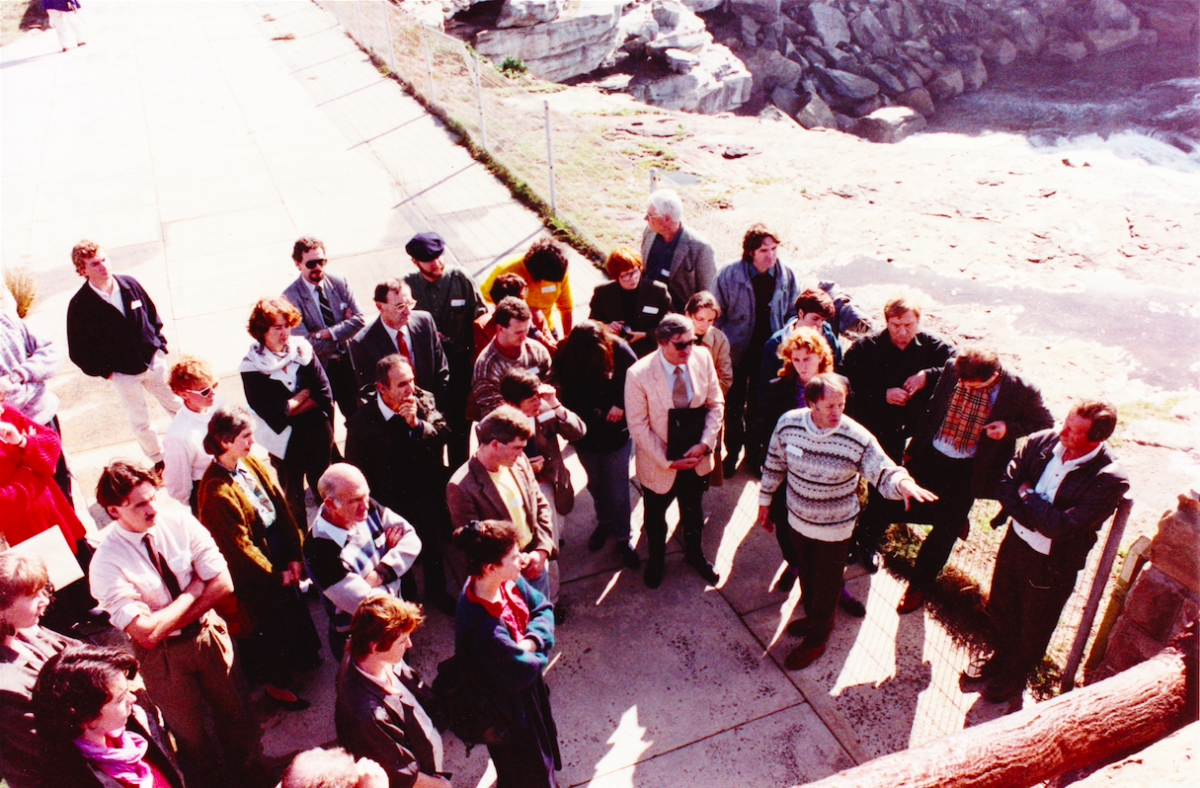
More than a decade later, Colin was still helping me to grow as a conservator. He was a staunch supporter of AICCM’s special interest group “Sculpture, Monuments and Outdoor Cultural Material”.
In 1996 Colin invited me to join him in teaching a preventive conservation workshop in Hanoi Vietnam. I am so grateful for that opportunity. Watching Colin manoeuvre through foreign protocol helped me enormously when I ran a separate workshop in Da Nang the following year.
I could always count on Colin for support and encouragement. He had a special gift for teaching – making complex chemistry understandable, and encouraging his students to have a go.
I miss you Colin. Love, Donna Hinton
—Donna Hinton, Graduate of the CCAE. Currently Conservation Consultant.
Dr Jan Lyall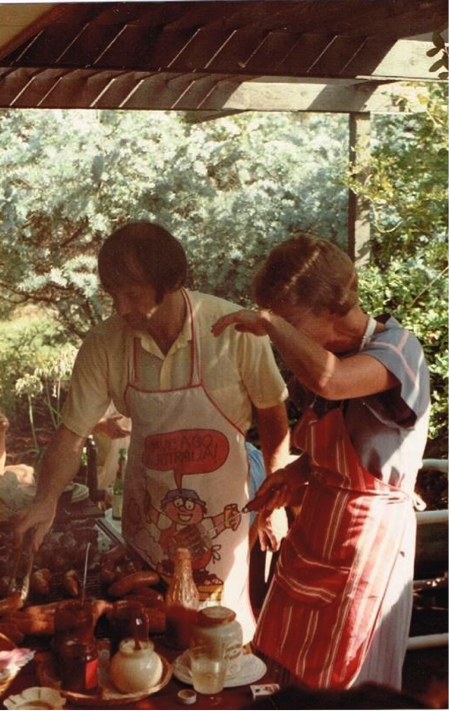
A fond memory I have of Colin is of him sitting in his hospital bed two weeks before he died, saying how much he loved autumn, walking slowly through the fallen leaves just kicking them as he went. I will always think of Colin whenever I walk through autumn leaves and I’ll have a good kick for him.
Colin – you have certainly earned the title of Father of Conservation in Australia. You made a huge difference to the lives of so many people, your leadership, vision, mentorship and belief in conservation have inspired and assisted us. We are your legacy and you will live on as long as the profession of conservation exists. Farewell Colin-we will miss you.
—Dr Jan Lyall, Completed CCAE Program. Currently Conservation Consultant.
NZCCM
Kua hinga te tōtara i Te Waonui a Tāne.
(A tōtara has fallen in the great forest of Tāne)
The executive committee and members of the New Zealand Conservators of Cultural Materials (NZCCM) extend condolences to our fellow conservators and members of the AICCM on the recent death of Emeritus Professor Colin Pearson. Many NZCCM members trained under Colin at the University of Canberra and he has been a significant influence on the development of conservation practice in Aotearoa New Zealand. NZ students remember Colin for his knowledge, skills and good humour. His leadership in developing conservation practice in Australasia and Pacific through teaching will be his enduring legacy. Colin’s wife, Gwyn and his sons are in our thoughts, his reach has been much greater than you may ever know, not just traversing disciplines but cultures.
Moe mai ra e te rangatira, moe mai, moe mai.
—Diana Coop, Graduate of the University of Canberra. Currently NZCCM President.
Dr Ian Macleod
The final word goes to Dr Ian MacLeod. Ian was a long time colleague and friend of Colin’s and has given his thoughts in verse.
Consolidated Colin
Across the continent the rain is falling down and bringing new life to the gardens.
On the eastern coast of our wide brown land the moisture comes in a different form,
It is tears of sadness mingled with joyous moments of delightful reflection on a man,
Who was without a peer group, unless you consider the likes of Whitlam and Keating,
For of a truth Colin Pearson was quite exceptional and we loved him for this difference.
From early photographs taken at the Materials Research Laboratory in Maribyrnong
That sparkling mind shines through the normal promotional gloss of white lab coat,
Here was a man on a mission to conserve and to demonstrate that much can be learned
From the layers and patterns of decay that surround all historic objects and materials.
For him, Cook was a champion to be emulated and so Captain Colin came to live in Perth.
Boundless as oceans tide, rolling in fullest pride he taught the Duke the finer points of decay.
Thus supported and inherently Regally noted with his MBE, Colin came to save the Dutch
Wrecks from losing their message of supremacy of involuntary settlement on distant shores.
Massacred bodies littered the shores of Beacon Island with their message for people unborn,
To heed the workings of a madman and to ensure that such depravities were not repeated.
As saints of old were translated when the political and ecclesiastical powers so decreed
Colin left the western shores and brought his message to Canberra, the centre of a nation.
His courses were carefully crafted with intially hand-picked students who all prospered.
New positions in conservation were developed and the graduates found good pickings.
One man had transformed the dry bones of conservation into a world of living activity.
With former students scattered around the globe and his international work almost done,
He moved down the coast with Gwyn to ensure that his vision of a different living mode
Could take root and flourish in well fertilised grounds of hope and a deep abiding love.
Several years were granted to allow the vision to be perfected and so time stood still awhile.
Caring, charming and witty to the end he has left us to instruct the angels in heaven.
Reflections on the life of Colin Pearson
25th April 2016
Ian D MacLeod
Important note to members
The memorial event for Professor Colin Pearson, planned to be held on 23rd June at the Ann Harding Centre, University of Canberra, ACT has been postponed until 2017. More information will be provided closer to the date.